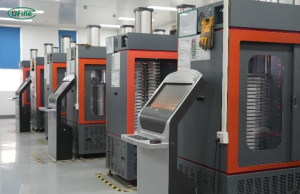Lithium-ion batteries are a critical power source for various modern technologies, from consumer electronics to electric vehicles. While these batteries offer excellent energy density and efficiency, their use also comes with certain safety risks. Many companies, such as Ufine Battery, provide custom battery solutions using Grade A cells and ensuring comprehensive battery certifications to address safety and performance concerns. However, understanding the potential hazards of lithium-ion batteries and adopting preventive measures is crucial for manufacturers and consumers. 
Understanding Lithium-Ion Battery Safety Risks
Lithium-ion batteries can pose safety hazards under specific conditions despite their widespread use. These risks often arise from:
- Thermal Runaway: One of the most common and dangerous failures in lithium-ion batteries is thermal runaway. This occurs when the battery overheats, leading to an uncontrollable increase in temperature, which can cause the battery to ignite or even explode.
- Overcharging: Charging a lithium-ion battery beyond its recommended limit can generate excessive heat, which, without proper safeguards, can result in thermal runaway.
- Physical Damage: When lithium-ion batteries are punctured or physically damaged, they are at risk of internal short circuits, which may lead to overheating and fires.
- Substandard Components: Using low-quality battery cells without proper certifications can significantly increase the risk of battery failure, especially under high-stress conditions like rapid charging or discharging.
Prevention Measures for Lithium-Ion Battery Safety
- Choose Batteries from Reputable Manufacturers
Always opt for batteries from manufacturers that adhere to strict quality control standards. Companies like Ufine Battery, known for using Grade A cells with comprehensive battery certifications, ensure that their batteries meet international safety standards, reducing the likelihood of failure. - Use Proper Chargers and Avoid Overcharging
Only use chargers that are compatible with the device’s battery. Improper chargers can lead to overcharging, increasing the risk of overheating. Battery Management Systems (BMS) are often integrated into devices to monitor and prevent overcharging, but using the correct equipment is still crucial. - Monitor Battery Health
Check your battery regularly for signs of wear and tear. Swelling, overheating, or slow charging may indicate the battery is compromised. Replace damaged batteries immediately to avoid potential hazards. - Safe Storage Practices
Lithium-ion batteries should be stored in cool, dry environments to prevent degradation. Heat exposure accelerates the breakdown of battery components, increasing the likelihood of failure. Avoid leaving devices in direct sunlight or enclosed spaces like cars during hot weather. - Handle Batteries with Care
Avoid dropping or puncturing lithium-ion batteries. Even slight physical damage can lead to internal shorts, which could cause the battery to catch fire or explode. If a battery appears damaged, stop using it and dispose of it safely according to local guidelines. - Recycling and Disposal
Always recycle lithium-ion batteries at certified recycling centers. Improper disposal can lead to environmental damage and fire hazards at waste management sites. Many cities provide drop-off points for safe battery disposal.

Ufine Battery’s Focus on Lithium Polymer Battery Development
With growing demand for safer and more efficient energy storage solutions, Ufine Battery is leading the way in developing lithium polymer batteries (LiPo). These batteries offer greater flexibility in design and improved safety characteristics over traditional lithium-ion batteries, making them ideal for devices that require higher energy density in a compact form. By focusing on LiPo technology, Ufine Battery addresses key safety challenges while pushing forward advancements in battery performance.
Future Innovations in Battery Safety
As battery technologies evolve, manufacturers are developing new ways to improve safety. Solid-state batteries, for example, use a solid electrolyte rather than a liquid one, minimizing the risk of leakage and thermal runaway. Advanced Battery Management Systems (BMS) are also being integrated into devices, providing real-time monitoring of temperature, charge, and voltage levels to prevent overheating and overcharging. These innovations and high standards from companies like Ufine Battery ensure a safer future for battery-powered devices.
Conclusion
Lithium-ion batteries play a vital role in powering modern technology, but they must be used cautiously due to inherent safety risks. Consumers and businesses can mitigate these risks by choosing batteries from reputable manufacturers, following proper charging and handling guidelines, and staying informed about emerging safety technologies. Advances in lithium polymer and solid-state batteries will continue to enhance safety and performance, ensuring that energy storage solutions keep up with the demands of a rapidly advancing technological world.
Information contained on this page is provided by an independent third-party content provider. Binary News Network and this Site make no warranties or representations in connection therewith. If you are affiliated with this page and would like it removed please contact [email protected]



Comments